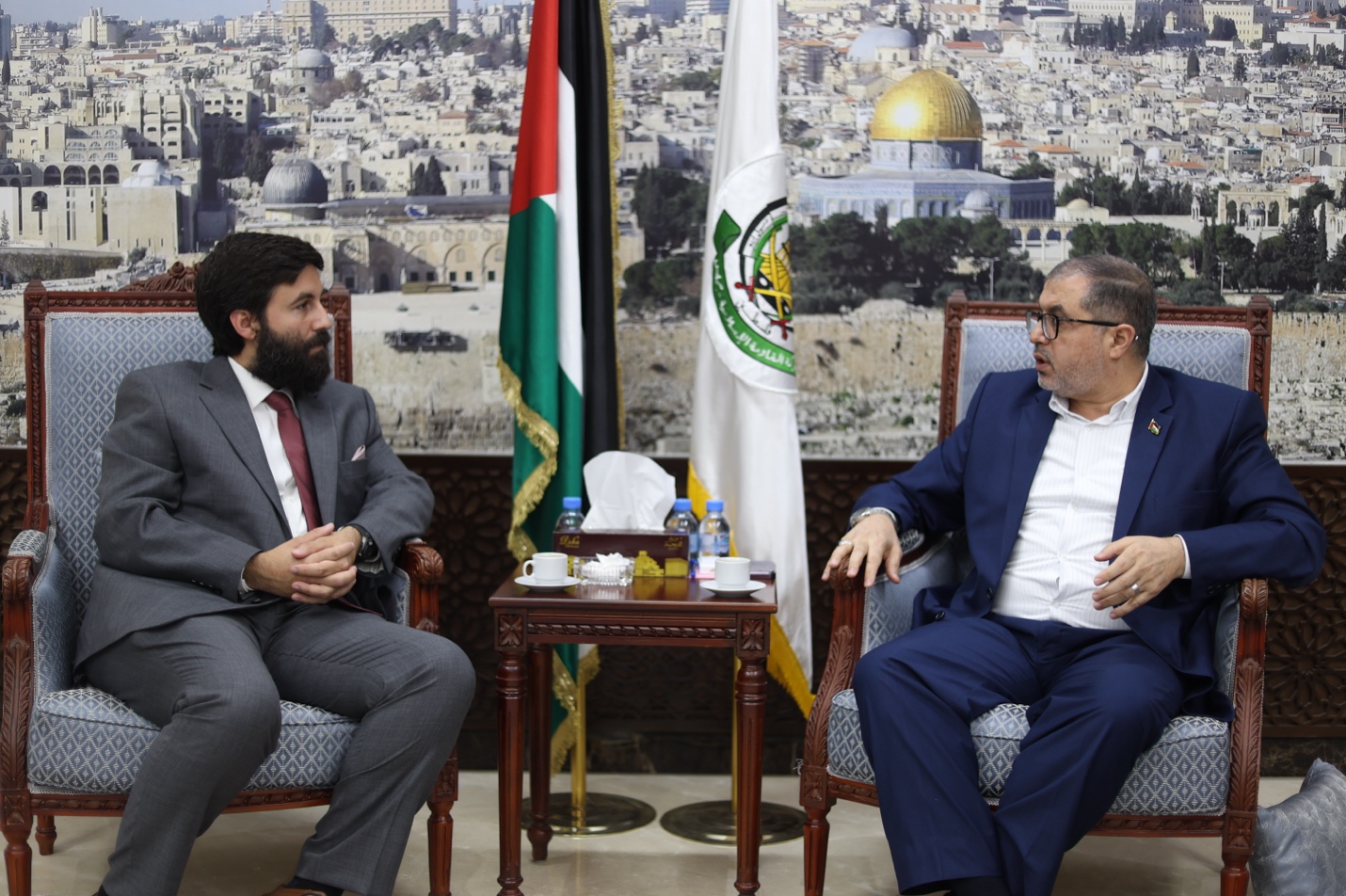
In late August, I traveled to Doha, Qatar, to meet and interview Hamas political bureau members Dr. Basem Naim and Osama Hamdan. After nearly four months of planning and coordinating, I was finally approved to come and conduct the interview at their diplomatic headquarters in Qatar. Given the security situation, the details were carefully orchestrated.
My arrival needed to be precise. Locations and instructions were provided to me mere minutes before I was supposed to arrive. After arriving, my passport and credentials were checked, I was screened for weapons and communication devices, and escorted through the complex to the diplomatic reception room. My cameraman, Mahmoud Dakhil and I set up and started the meeting right on time. What was scheduled for an hour turned into a nearly three-hour meeting that explored various aspects of the ongoing negotiations, the history, and the complex realities on the ground in Gaza, in the other areas of Palestine, and beyond.
Due to the complexity and sensitivity of the then ongoing cease-fire negotiations, I decided to hold off publishing the transcript until a cease-fire deal was reached. Now with a tentative deal in place which I provide more details of below, I have published an edited transcript of our conversation below.
Dr. Basem Naim is a member of the Politburo of Hamas and served as the Minister of Health during the Palestinian Authority Government of March 2006 (popularly known as the First Haniyeh Government) and later as Minister of Youth and Sports in the Palestinian National Unity Government of March 2007 (popularly known as the Second Haniyeh Government). He represented Hamas during negotiations in Moscow in 2023.
Osama Hamdan is a member of the Politburo of Hamas and served as the Representative of Hamas in Tehran, Iran, from 1992 to 1998 and as the Representative of Hamas in Lebanon from 1998 to 2009. Since then, Osama Hamdan continues his diplomatic and political work for Hamas.
Christopher Helali: First, I would like to extend my deepest condolences and profound sympathies to you, to all of the members and supporters of Hamas, and to the Palestinian people on the assassination of Ismail Haniyeh and all the martyrs and innocent lives lost during this brutal genocide in Gaza. Given that we are 11 months into this brutal and horrific genocide of the Palestinian people in Gaza, what can you tell us about the status of cease-fire negotiations and the possibility of achieving a durable and lasting peace to end the suffering of the people of Gaza?
Dr. Basem Naim: Thank you very much for your visit. It is really appreciated from the movement, from our people in Palestine in general, in Gaza in particular, for a U.S. citizen to come here to show his solidarity and sympathy with the just cause of the Palestinian people. We believe that this is the real spirit of most of the people around the world, including the United States.
We believe that the American policies are not representing the wish and the will of most of the Americans, because any human being who believes in justice and peace, he will stand on the right side of history to support the oppressed people and the just cause of the Palestinian people.
What we are struggling for and what we are fighting for now for 75 years or more is how to get rid of the occupation. How to live like any other people in peace and security. How to secure a better and prosperous future for our children. How the Palestinian people who are really very ambitious can participate with other people, other nations around the world, for the goodwill of all people around the world.
We have offered at different stages a political solution to this conflict, but unfortunately the Zionist regime, not only this Zionist fascist regime led by Netanyahu, unfortunately supported by the American administrations, all the time they have undermined these chances hoping that day after day the Palestinians will become fatigued and give up their hopes of independence, freedom, self-determination, and right of return. Then they can implement their dreams, which is a nightmare for us, how to annihilate the Palestinian people, how to terminate the Palestinian existence on their own land, and how to build the greater state of Israel on the corpse, not only of the Palestinians, but of a lot of people here in the region.
I have here also to emphasize that our struggle is only against the occupation, regardless of its nationality, or religion, or political faith. We are fighting only against the occupation, someone who is driving a tank, or to attack our people, to destroy our houses. We have never had any problems with people of other religions, in particular here, in this case, with Jews or Judaism. On the contrary, we have a lot of friends who are Jews and who are good friends of us who are supporting our cause.
By the way, when Jewish communities in Europe and the West, in different countries, even before the Holocaust, were persecuted and attacked from different regimes in Europe, since the 19th century, they were welcomed in all Arab and Islamic countries, including in Palestine. They have lived in peace with our people for decades. The problem was serious only when they started to convert this humanitarian situation of the Jewish people who were persecuted in different countries in Europe into a political project on the corpses of the Palestinian people. Those who have offered them space in a house and accommodation, they have to leave the country based on some beliefs and tools from religious books.
Our struggle is only for freedom, dignity, independence, peace, and prosperity, a better future for all people. But again, we are not ready to give up or surrender under any kind of violence or massacres or from any party, not only the Israeli party. Therefore, we hope that the American people can understand the real story on the ground. It is a fight of people who are looking for freedom and dignity against oppression.
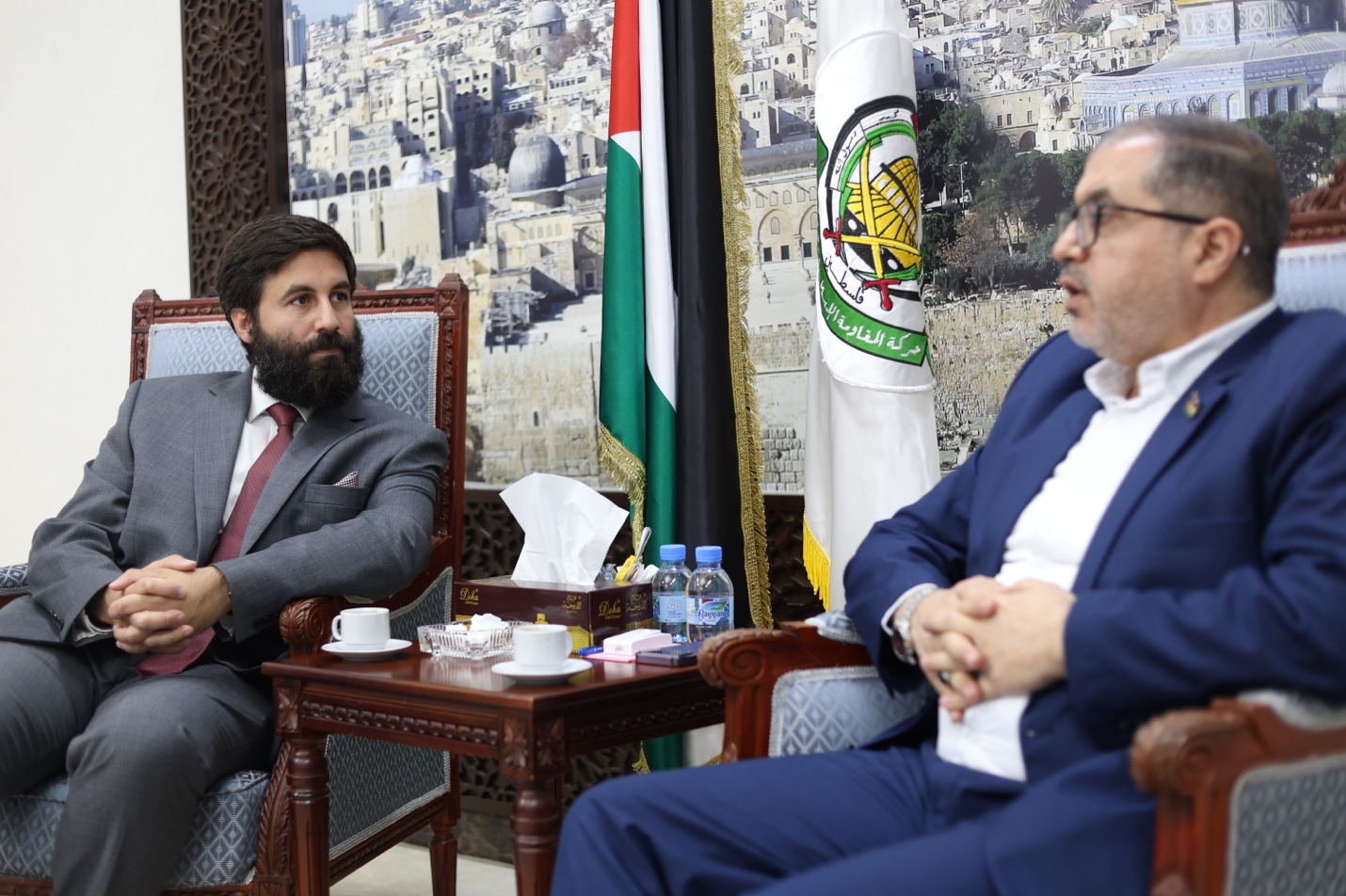
Unfortunately, we have always asked journalists, politicians, and diplomats only to tell the people, the ordinary people everywhere, including in the United States, the reality on the ground, what they have seen with their own eyes.
We are not asking anyone to fabricate stories or to lie on behalf of the Palestinians, only to reflect the reality. Can you imagine that the Gaza Strip, for example, 2.3 million Palestinians living now for more than 17 years under a suffocating siege?
So that a lot of international human rights organizations, including, by the way, some Israeli organizations, they have considered the Gaza Strip as the biggest open-air prison and one of the concentration camps of the 21st century with 70% of those 2.3 million people being children and minors with no hopes, no future, no horizon. This has led to the moment we are living now.
Again, what we are calling for is only to implement what humanity has agreed upon in international law and international humanitarian law, that all people have the right to their freedom, dignity, independence, and sovereignty.
When we have resorted to armed resistance, it is not only based on a historical reading of the conflicts everywhere in Vietnam, Algeria, and South Africa, but it is also based on international humanitarian law and international law that all people under occupation have the right to resist their occupation by all means, including armed resistance.
But this happened after we have given all the chances for a political solution and we have failed. No, we didn’t fail. The international community has failed.
Unfortunately, with the support of the United States, Israel has behaved as a rogue state, as a state above the law. Therefore, what we are calling for once again is to implement the international resolutions which are guaranteeing the Palestinians all the rights to an independent self-sovereign state. Palestinians have the right to a better future, the right of return, and also the right of resistance.
Welcome again and we hope to see the American people in the streets, the universities and everywhere supporting our just cause. We were really very proud of observing and watching thousands and thousands of Americans in the streets, in the railway stations, at the universities, protesting and demonstrating for the just cause of Palestine and against the genocide and massacres committed by the Israeli regime against our people. By the way this is not our description of the case, this is the ICJ description of the situation on the ground that it is a genocide and it has to be stopped. The children and people of Palestine have the right of a better future. Thank you very much.
Christopher Helali: Thank you very much, Dr. Naim.
Dr. Basem Naim: Before asking brother Osama to talk a little bit about the latest when it comes to the negotiations, I have to say that we Palestinians we believe, yes, we are paying a very, very, high price, a very precious price for this struggle to achieve our goals, but we believe we are on the right way and we will sooner or later achieve our goals. This is the history of a lot of people around the world in Vietnam, in Algeria, in South Africa and other countries.
Unfortunately, we didn’t resort to armed resistance because we are for violence, but they have obliged us when they have blocked any chance for a political solution, they have undermined any chance to reach a solution for this conflict.
But we believe sooner or later we will achieve our goals and we are enjoying enough strength and commitment and we have enough dreams to fulfill in the future. Therefore, inshaAllah [God willing], we will with you celebrate our victory and freedom and independence and self-sovereignty and right of return in Jerusalem, the capital of the free state of Palestine.
Osama Hamdan: When what’s called in Europe the Crusades came to Palestine, we don’t call it a crusade, we call it “the foreigners war,” this is in our books, when they came to Jerusalem, they killed in the first days around 30,000 Palestinians who were living in Jerusalem.
They did not differentiate between a Muslim and a Christian. Christians were killed at the same time. Here is new information that may be shocking for most of the people. The keys of the Church of the Holy Sepulchre are in the hands of a Muslim family for more than 1,000 years. They do not differentiate between Muslims and Christians, so they trust each other.
Even the Jewish people, when they came to Palestine in the 18th century, they were not kicked out, they were not treated badly, they were welcomed. We used the word Hawajah; it’s a kind of respect for them, but when they tend to be part of the Zionist strategy as a project, that creates problems, and that happened under the occupation of the British Empire at that time.
Going back to the negotiations, or, what’s called the negotiations, it’s a long period of negotiations, it’s around six months, more than six months, started in fact before even the Paris meeting in February.
But I have to say through that process, we were committed to the main principles which were declared in the Paris meeting: the cease-fire, the complete withdrawal from Gaza, sending the needed aid for the Palestinians, the reconstruction, and to lift the siege on Gaza.
Then we were talking about prisoner’s exchange. Through that process, it was clear that whenever the mediators sent some ideas, the Israelis’ reaction was either to commit new massacres to undermine the process or to add more conditions which maybe were not negotiated before or either negotiated and agreed upon before.
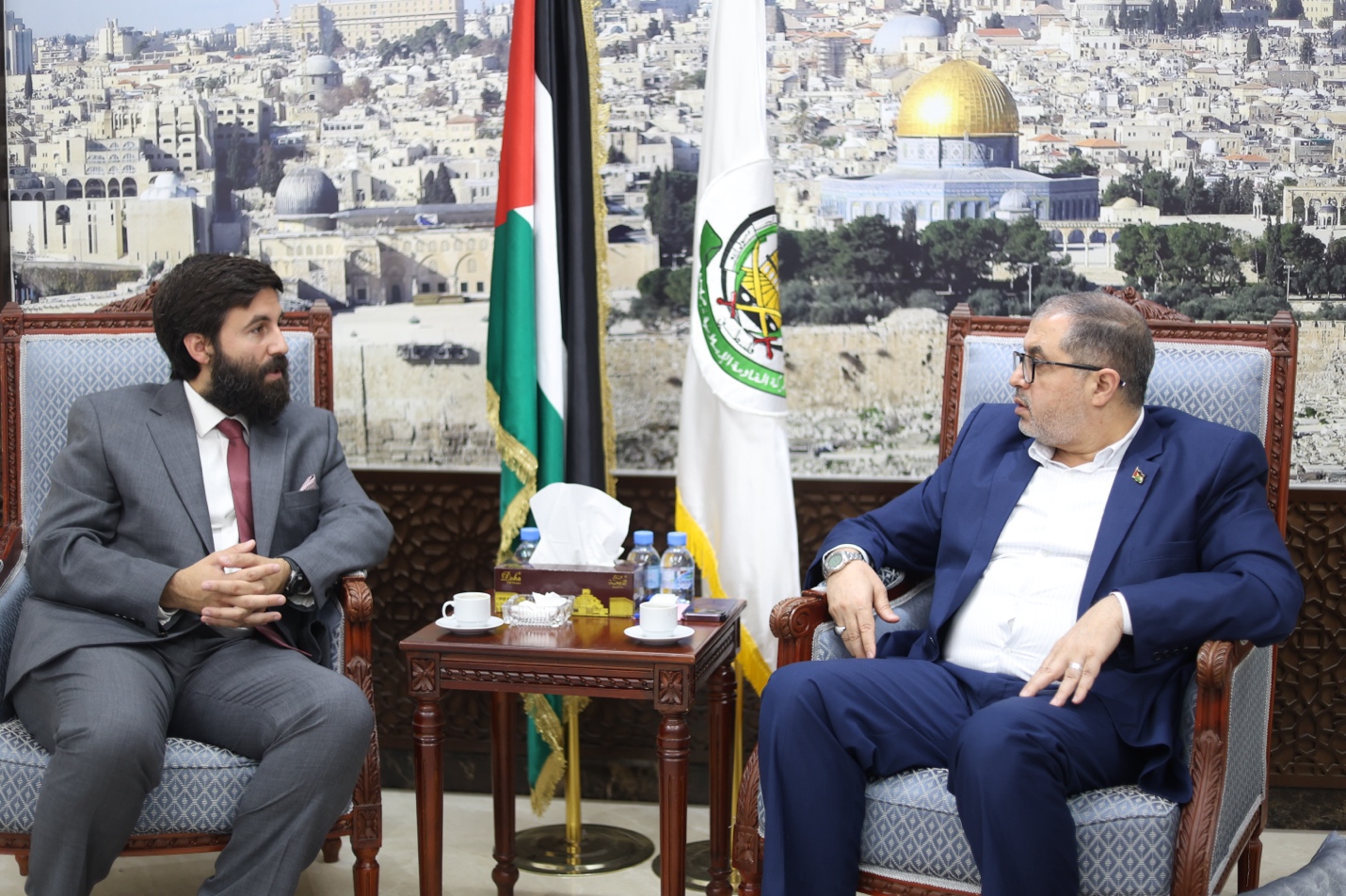
I don’t want to talk about the whole process, we are preparing a paper about that, so I think our brother, Dr. Basem, will send it for you. But we have at least two important steps. The first one, the mediators have sent a proposal at the 5th of May.
We discussed that proposal on the level of the leadership, and we agreed on that. The next day we informed the mediators that it’s okay, we accept the proposal as it is. We have, you know, you can’t have a complete 100% proposal, but at least we felt it’s a good proposal.
The reaction of the Israelis the next day, the 7th of May, was to invade Rafah. They went to Philadelphi, and they put their hands on the crossing point of Rafah. That means a complete siege on Gaza, nothing coming in or getting out of Gaza.
They committed a massacre in Khan Yunis. After three weeks of that, the Israelis sent a new paper with a lot of changes. They said that was their answer for the proposal. Anyway, that was on the 27th of May.
Four days later, President Biden reacted in his famous public speech. He has his own initiative, based on their paper, in fact, more than anything else. But he concentrated on the same principles which we have talked about.
Then there was the International Resolution at the Security Council on the 10th of June. Although we have some problems with some sentences, in general, we felt that it’s a good chance to achieve the goals.
The Israelis did not react. On the 24th of June, the Americans sent a paper, a proposal, through the mediators, based on a Biden initiative and the International Security Council Resolution, and mostly on the Israeli paper.
We discussed the proposal with them, and there were guarantees if we accept some ideas, they will have an acceptance or an agreement from the Israeli side. In general, it was an accepted proposal from Hamas, so we declared our acceptance on the 2nd of July.
What was the reaction of the Israelis? They committed the massacre of al-Mawasi [July 13, 2024]. They claimed that brother Mohammed Deif was there, he wasn’t there, and they knew that they were lying. More than 75 [90] Palestinians were killed.
Al-Mawasi was announced as a safe zone in Gaza, so they killed 75 [90] Palestinians and more than 200 were injured. Then they committed another massacre in Khan Yunis, around 30 Palestinians were killed, and then they assassinated brother Ismail Haniyeh.
They expected that we would say we are not participating in the negotiations anymore. Our reaction, which was told to the mediators, was that, although it was a heavy price, but it was made from the blood of the Palestinians. Brother Ismail Haniyeh is a leader, but we don’t differentiate between Brother Ismail Haniyeh and any Palestinian leader and the people of Palestine. We are still committed, but we want to implement what we have agreed on. It’s your proposal, and we are ready to implement that directly.
On the 8th of August, they had the declaration from President Biden, Sheikh Tamim, and President Sisi. The next day within a few hours, they committed the massacre at the Al-Tabaeen school. They knew that there were no militants, no leaders from Hamas, no senior officials from the Palestinian Authority, but they wanted to sabotage everything.
In this massacre, they killed directly 100 Palestinians. Now the number is around 130, because some people passed away after a few days, and more than 250 Palestinians were injured. No one said anything.
Then they said that they would have a meeting on the 15th of August. Our position was clear. We told the mediators there is no need for more negotiations. We have achieved at least twice a good proposal introduced by the mediators, and each time the Israelis are sabotaging that.
If we follow that process, they will sabotage any proposal at any time. They don’t want to have a cease-fire. They want to continue the genocide. So, it’s your turn as a mediator, not just to provide ideas. You have to make the needed pressure to implement those ideas, especially since there is a side who’s saying, “okay,” and they say “okay,” and then they move to sabotage that on the ground.
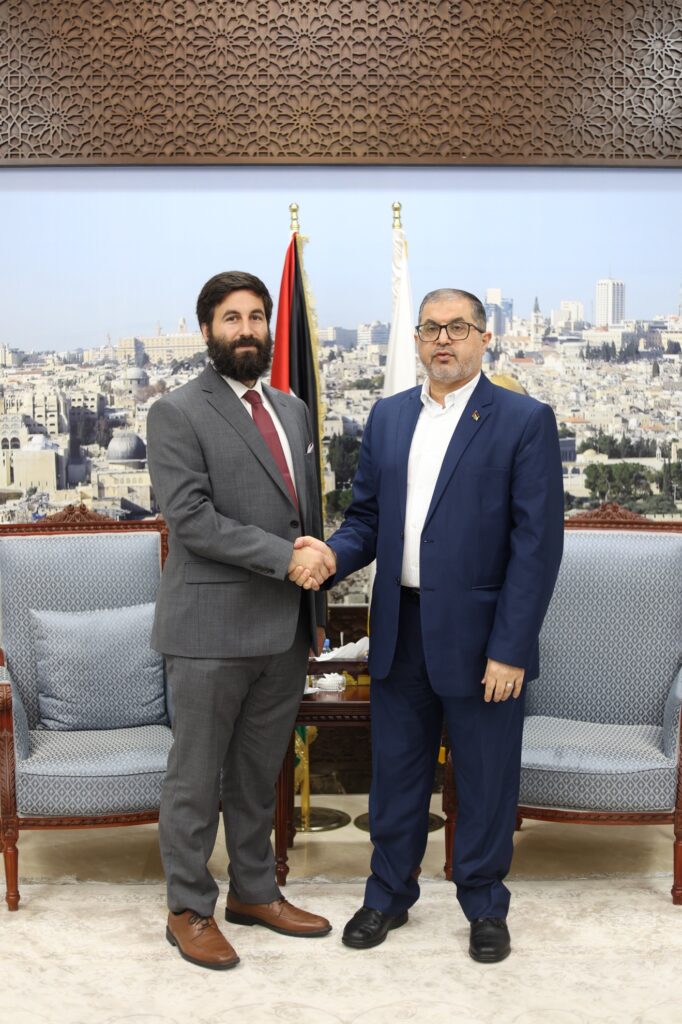
What happened? Our expectation, when they started talking to the Israelis, they added the new conditions, and they said “no” for something they had previously said “yes” to. For example, in the old proposal, the Israelis agreed to withdraw from Gaza, including the Netzarim axis.
This time they said they wanted to stay on Netzarim axis, and they added it. They wanted to check all the Palestinians who had to go through the Netzarim to the northern part. They said that they would stay in Philadelphi. They would not move.
Under pressure the Israelis said, we can do some changes, but we will keep Philadelphi in our hands. They will not leave the Rafah crossing point. Even the prisoner exchange, they have changed the things which they have agreed on.
All the prisoners who are supposed to be released, at least 150 of them, they have to be deported from Palestine, which is something which we can’t accept. He may make as a person his choice to leave, but you can’t agree as a leadership in Palestine to deport any Palestinian.
We want our people to come back, not to send them out. So, the mediators understand that they are facing new ideas, so they postpone that in order to move discussions. They came to us, we’ve told them, we have told you before that we don’t consider ourselves part of this period of the process. You have to solve it by yourselves. In fact, instead of solving that, we saw what happened with Blinken. He came to Palestine and he said in public that Netanyahu accepted all the ideas.
No one knows what the ideas were. Then Netanyahu declared that he accepted the modified proposal. No one knows what the modifications were. Then he talked in public that he would not withdraw from Netzarim, he would not withdraw from Philadelphi. He would not allow even the [humanitarian] aid to come as the Palestinians want.
He connected that by the acceptance of the Palestinians. So, it’s part of the genocide, even sending the aid to the Palestinians. I know that Blinken is criticized now from senior American officials, but it seems to me that what we were expecting is happening now.
The big question was what will happen next. As Palestinians, we are seeking to protect our people. We are seeking to stop the bloodshed in Gaza. But if the Israelis continue the genocide, we have to continue our way to resist the occupation.
We have to continue resisting this genocide. We have to call on all the free people all over the world to support us, maybe by more action against the Israeli genocide, against the governments who are protecting and supporting Israel, to change their positions.
I believe just if someone said in the United States in charge that we will not send more weapons to Israel, that will be enough pressure to stop the whole genocide. If they said we will not support the economy of Israel, that will stop the genocide.
We are not dreaming that the United States will launch a war in order to protect the Palestinians. In fact, the [U.S.] administration was part of the genocide. I know this is against the will of maybe more than 90% of the Americans, but this is the fact.
They were part of the genocide. They will not launch a war. At least they are supposed to say “enough is enough.” We hope that can happen. We believe that what had happened in the universities was very important, because it shows the will of the new generation. A generation who can’t be controlled by the media, who can’t be controlled just by emotions, a generation who understands the things, understands the situation, and the issues. They have their own beliefs and their own ideas based on the justice for all the people. We hope that can be continued and can be effective.
Thank you very much.
Dr. Basem Naim: If you allow me to add some points. First of all, from day one when we were contacted by the mediators after Israel launched this war against our people, we have shown clear commitment to protect our people and to have an end to this aggression.
Therefore, we have shown the maximum positivity and being constructive in order to find a way how to reach a cease-fire agreement. Second, from the first week we have discussed with the mediators and this political vision of three phases was handed over to the mediators and also to other countries like Russia, China, Turkiye, even the Americans, that yes, we don’t believe that it has started on October 7th and as Mr. Guterres has said, October 7th didn’t come from a vacuum. We are talking about a long-standing conflict for 75 years. Therefore, it is not only about a cease-fire, it is about how to solve this conflict.
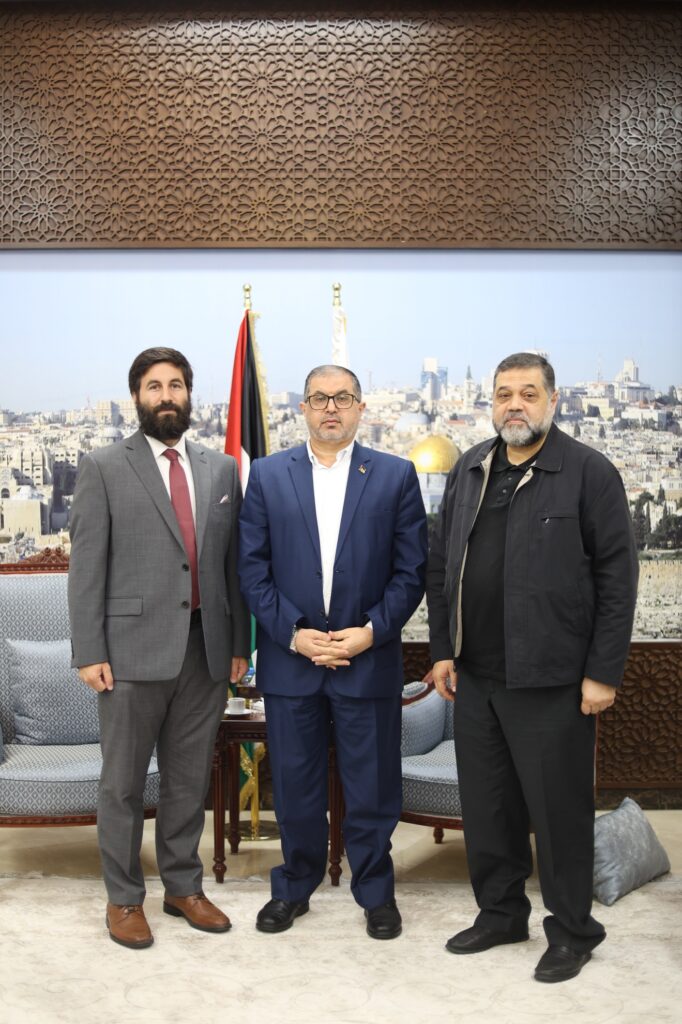
Therefore, we have from the first week offered a three-phase conflict resolution proposal. Phase one was to talk about a cease-fire; lifting the siege, ending the occupation in Gaza Strip and so on and so on.
Phase two is to achieve a Palestinian-Palestinian reconciliation and Palestinian unity, ending the division by forming a Palestinian unity government representing all Palestinians. We are not eager to be part of this government but we are interested to have a government which is representing all Palestinians because we know that, or we knew that, in most of the stages, the reconciliation process was blocked or undermined because of the American and Israeli interference and conditions.
Phase three—all the Palestinians together as a leadership can engage with the international community about how to find the final solution for this conflict based on the related international resolutions when it comes to the independence, self-sovereignty, right of return, and so on. I think this has been offered in the first week.
What I mean is that, despite this horrific aggression, all these massacres, we were still committed to a political solution. We didn’t think within the context of revenge. Therefore, we are considering October 7th as an act of defense.
We didn’t initiate the process of violence. We were the victims of state terrorism for 75 years. The third point is this unlimited U.S. support for the Zionist regime as a political entity and also to give them all the impunity they need to behave as a rogue state, as a state above the law.
Only during this conflict, Israel has enjoyed—three or four times—a veto used by the Americans to protect them at the international level as well as all kinds of military support and billions of dollars in economic support.
Beyond this stage of the conflict, which is still confined within the Palestinian borders, if the Americans think of the security, stability and prosperity of the whole region for the whole world, because this is a region which is a connection point for all the people around the world, this is not the way to secure stability, security and prosperity for the region.
On the contrary, Netanyahu from day one was planning how to widen this conflict beyond the Palestinian borders into a regional war. Therefore, if the Americans think really of their strategic interests and how to keep this region calm, how to secure stability here, they have to say a clear word: “Enough!” We cannot continue giving you this unlimited support. We believe that the Americans have more interest, strategic interest, with the nations here than with this Zionist fascist regime.
By the way, if they think that they might be able to break down or to defeat the people of Gaza, or to defeat Hamas, or to defeat or to annihilate the resistance, now they are creating new generations of young people, not only in Palestine, all over the region, who are so angry, desperate, and full of willingness for revenge that I am sure within the next two, three decades, they are paving the way for instability and violence in the region.
This is not the way to create peace or the way to create stability or security, not only for us. We are ready and we are committed for our cause. We are ready to pay the price. But it’s also the security and the peace for other nations, including the Americans.
The third one, how can I understand that the Secretary of State of the United States, Antony Blinken, yesterday, when someone asked him about the humanitarian aid to the people of Gaza, what was his response?
Instead of talking loudly that international humanitarian law is obliging Israel to allow, even during the war, all the humanitarian aid to come into Gaza or to influx into Gaza, he said the shortest way is Hamas to sign the proposed agreement. Hamas to accept the offered deal from Israel.
It means he is blackmailing the Palestinian people by their food, medicine, and basic rights, politically to serve Israel. I think when the people, when humanity created or wrote this international humanitarian law, the idea was that sometimes we are not able to avoid wars.
But if it has to happen, we have to have some rules and regulations to secure innocent people, to secure civilians. During this war, with the support of the Americans, all the lines when it comes to international humanitarian law were crossed.
Hospitals destroyed, mosques destroyed, shelters destroyed, UN headquarters, aid workers, international aid workers killed with the support of the Americans. Yes, I mean, Israel is doing this because Antony Blinken in a press conference said yes, if we want to transport aid into Gaza, Hamas has to accept the offered deal. This is not politics which is coping with international law and international humanitarian law.
I think this is a war crime in itself and this is a direct participation in genocide. This is the blackmailing of innocent civilians who are not part of this direct military conflict by their basic rights, food and medicine.
Therefore, I think Americans have to bring him to accountability. You are talking on behalf of millions of Americans that you are ready to besiege and to suffocate millions of innocent people in order to serve Israeli politics.
I mean this is adding to the participation by weapons and money. Therefore, I think we are expecting from people who are looking for peace, security and stability, who are loving freedom and dignity for all people to stand up and to say “enough is enough.”
I cannot imagine that any American Muslim can come to Palestine and say, I am here to support you as a Muslim, not as an American. This is essentially what Blinken said in the first day when he came to the region.
Again, we are still committed to the brokered deal of July 2, but we are not ready to accept all these added conditions because it means we are accepting the re-occupation of the Gaza Strip, the continuation of the siege on the Gaza Strip, the restrictions and the control of the movement inside the Gaza Strip, regardless of the price which we are going to pay.
Thank you very much.
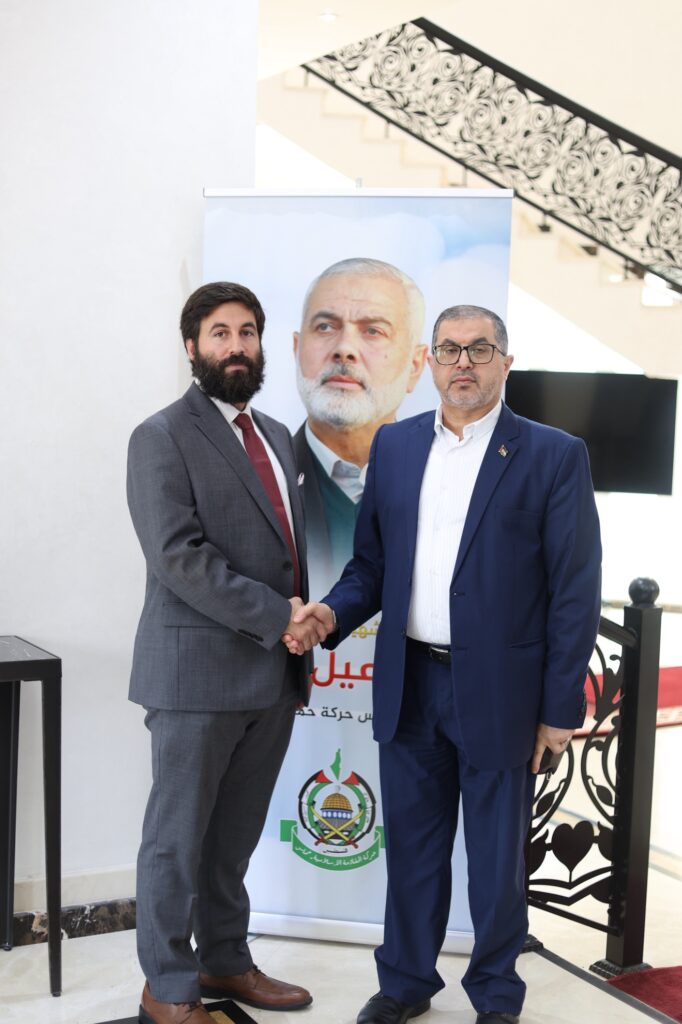
Early in the morning on Wednesday, January 15th, I received pictures and scans of the cease-fire agreement that I have included below from Dr. Basem Naim. The Press Statement that was released on January 15, 2025, from Hamas was titled “On the Announcement of the Cease-fire in Gaza Agreement” and listed four main aspects of the agreement.
One: The cease-fire agreement is the result of the legendary resilience of our great Palestinian people and our valiant resistance in the Gaza Strip over more than 15 months.
Two: The agreement to stop the aggression on Gaza is an achievement for our people, our resistance, the Ummah [Islamic nation], and the free world. The agreement is a milestone in the conflict with the enemy, on the path to achieving our people’s goals of liberation and return.
Three: This agreement is driven by our responsibility toward our steadfast people in the Gaza Strip to stop the Zionist aggression against them and halt the bloodbath, massacres and genocidal war to which they are being subjected.
Four: We express our gratitude and appreciation for all honorable official and popular stances at the Arab, Islamic and international levels that voiced solidarity with Gaza, stood with our people, and contributed to exposing the occupation and halting the aggression. We extend special thanks to the mediator brothers, who exerted great efforts to reach this agreement, especially Qatar and Egypt.
On January 16th, I received the following word document of the agreement with a message from Dr. Basem Naim which stated, “This is the text of the proposed agreement from May 2024, announced by President Biden and adopted as part of UN Security Council Resolution 2735. It is the same agreement reached yesterday, along with annexes detailing the mechanisms for implementing the agreement and the humanitarian protocol for aiding the people of Gaza.”
This below is the exact text of that word document that was sent to me:
Basic Principles for an Agreement Between the Israeli and Palestinian Sides in Gaza on Prisoner and Detainee Exchange and Sustainable Calm
Israeli Response to the Proposal Dated May 6, 2024
The following framework aims to secure the release of all Israeli detainees in the Gaza Strip, including civilians and soldiers, regardless of their condition—alive or deceased—and irrespective of the time or duration of their detention. This will be in exchange for an agreed-upon number of prisoners held in Israeli prisons, alongside achieving sustainable calm through a permanent cease-fire, the withdrawal of Israeli forces from Gaza, reconstruction of Gaza, and lifting the blockade, including opening all border crossings and allowing unrestricted movement of people and goods.
The framework agreement consists of three phases, as outlined below:
Phase One (42 Days):
- Both sides will cease military operations temporarily. Israeli forces will withdraw eastward, away from densely populated areas, and reposition along the Gaza border, including the Gaza Valley (Netsarim Axis and Kuwait Roundabout) as detailed below.
- Daily suspension of aerial military and reconnaissance operations in Gaza for 10 hours, extended to 12 hours on days designated for prisoner exchanges.
- Return of Internally Displaced Persons (IDPs) and Gaza Valley Withdrawal (Netsarim Axis and Kuwait Roundabout).
- On the seventh day (following the release of seven female detainees), Israeli forces will withdraw entirely from Al-Rashid Street eastward to Salah Al-Din Street. Military sites and installations in the area will be completely dismantled. Internally displaced persons will begin returning to their homes (without bearing arms during their return). Freedom of movement for residents will be restored across the Gaza Strip, and humanitarian aid will begin flowing into the area through Al-Rashid Street from day one without restrictions.
- On the 22nd day, Israeli forces will withdraw from the central sector (especially the Al-Shuhada Netsarim Axis and the Kuwait Roundabout Axis) east of Salah Al-Din Street to areas along the border. All military sites and installations will be fully dismantled. IDPs in northern Gaza will continue returning to their homes (without bearing arms during their return). Freedom of movement for residents across the Gaza Strip will remain unrestricted.
- From day one, intensive and adequate humanitarian aid, relief materials, and fuel (600 trucks, including 50 fuel trucks, with 300 trucks allocated to the north) will enter Gaza. This includes fuel for operating the power plant, trade, debris removal equipment, and the rehabilitation and operation of hospitals, health centers, and bakeries across Gaza. This flow will continue throughout all phases of the agreement.
4. Exchange of Detainees and Prisoners Between Both Sides:
During this first phase, Hamas will release 33 Israeli detainees (alive and deceased remains), including women (civilians and soldiers), children (under 19 years old and not enlisted), the elderly (over 50 years old), and sick and injured civilians, in exchange for an agreed-upon number of prisoners held in Israeli prisons and detention centers, as follows:
- Hamas will release all living Israeli detainees who are civilian women and children (under 19 years old and not enlisted), in exchange for Israel releasing 30 children and women prisoners for each Israeli detainee released. This will be based on lists submitted by Hamas, prioritizing those with the longest periods of detention.
- Hamas will release all living Israeli detainees who are elderly (over 50 years old), sick, or injured civilians, in exchange for Israel releasing 30 elderly prisoners (over 50 years old) and sick prisoners (provided they have less than 15 years remaining of their sentence), for each Israeli detainee. This will be based on lists submitted by Hamas, prioritizing those with the longest periods of detention.
- Hamas will release all detained Israeli female soldiers who are alive, in exchange for Israel releasing 50 prisoners for each female soldier released (30 serving life sentences and 20 with sentences not exceeding 15 years remaining). This will be based on lists submitted by Hamas, excluding a number (at least 100) to be negotiated in the second phase. An agreed-upon number of prisoners (at least 50) sentenced to life imprisonment will be released to locations outside Gaza or within Gaza.
5. Mechanism for the Exchange of Detainees and Prisoners During Phase One:
- On the first day, Hamas will release three Israeli civilian female detainees. On the seventh day, Hamas will release four additional Israeli civilian female detainees. Subsequently, Hamas will release three Israeli detainees every seven days, prioritizing women (civilians and soldiers) and all living detainees to be released under this phase. The remains of the deceased will be handed over after all living detainees have been released. During the sixth week, Hamas will release all remaining detainees covered under this phase, while Israel will release the agreed number of prisoners based on lists submitted by Hamas.
- By the seventh day, Hamas will provide information on the number of Israeli detainees to be released during this phase.
- In the sixth week (after the release of Hisham Al-Sayed and Avera Mengistu, who are among the 33 detainees agreed to be released during this phase), the Israeli side will release 47 prisoners from the Shalit deal who were re-arrested.
- If the number of Israeli detainees to be released in this phase does not reach 33, the number will be supplemented by remains of the deceased from the same categories covered in this phase. In return, Israel will release all women and children (under 19 years old and not enlisted) detained from Gaza after October 7, 2023, during the sixth week.
- The exchange process is contingent upon adherence to the agreement’s terms, including halting military operations by both sides, Israeli troop withdrawal, the return of IDPs, and the entry of humanitarian aid.
6. Released Palestinian prisoners will not be re-arrested on the same charges for which they were previously imprisoned. Additionally, the Israeli side will not require released Palestinian prisoners to serve the remainder of their original sentences or sign any documents as a condition for their release.
7. The exchange terms for detainees and prisoners in this first phase will not serve as a basis for negotiations in the second phase.
8. No later than the 16th day, indirect negotiations will commence between the two sides to agree on the terms of the second phase, including the exchange terms for detainees and prisoners (soldiers and remaining men). This agreement must be finalized before the end of the fifth week of this phase.
9. The United Nations, its agencies, and other organizations will provide humanitarian services across all areas of the Gaza Strip throughout all phases of the agreement.
10. Infrastructure rehabilitation (electricity, water, sanitation, telecommunications, and roads) will begin across Gaza. Agreed quantities of equipment for civil defense, debris removal, and rubble clearance will be delivered, with such efforts continuing throughout all phases of the agreement.
11. Facilitate the entry of necessary supplies and requirements to shelter internally displaced persons (IDPs) who lost their homes during the war. This includes no less than 60,000 temporary housing units (caravans) and 200,000 tents.
12. After the release of all Israeli female soldiers, an agreed-upon number of injured military personnel will be allowed to travel through the Rafah crossing for medical treatment. Additionally, the number of travelers, patients, and injured individuals allowed through the Rafah crossing will be increased, restrictions on travel will be lifted, and the movement of goods and trade will resume.
13. Arrangements and plans will commence for the comprehensive reconstruction of homes, civilian facilities, and civil infrastructure destroyed during the war. Support for affected areas under this clause will be provided under the supervision of several states and organizations, including Egypt, Qatar, and the United Nations.
14. All measures related to this phase—including the temporary suspension of military operations by both sides, efforts to provide aid and shelter, troop withdrawal, etc.—will continue into the second phase as long as discussions regarding the terms of the second phase remain ongoing. The guarantors of this agreement will make every effort to ensure that these indirect discussions continue until both sides reach an agreement on the terms of the second phase.
Phase Two (42 Days)
15. A declaration of sustainable calm (a permanent cessation of military and hostile activities) will take effect before the exchange of detainees and prisoners between the two sides begins. This includes the release of all remaining Israeli male detainees who are alive (civilians and soldiers) in exchange for a number of prisoners in Israeli prisons and detainees in Israeli detention centers, alongside the complete withdrawal of Israeli forces from the Gaza Strip.
Phase Three (42 Days)
16. The exchange of all remains of the deceased held by both sides will be carried out after identification and verification.
17. Implementation of the Gaza Strip reconstruction plan will commence over a period of three to five years. This includes rebuilding homes, civilian facilities, and civil infrastructure, with support for all affected areas under this clause provided under the supervision of several states and organizations, including Egypt, Qatar, and the United Nations.
18. Border crossings will be opened, facilitating the movement of people and goods.
Guarantors of This Agreement
Qatar, Egypt, and the United States.

CovertAction Magazine is made possible by subscriptions, orders and donations from readers like you.
Blow the Whistle on U.S. Imperialism
Click the whistle and donate
When you donate to CovertAction Magazine, you are supporting investigative journalism. Your contributions go directly to supporting the development, production, editing, and dissemination of the Magazine.
CovertAction Magazine does not receive corporate or government sponsorship. Yet, we hold a steadfast commitment to providing compensation for writers, editorial and technical support. Your support helps facilitate this compensation as well as increase the caliber of this work.
Please make a donation by clicking on the donate logo above and enter the amount and your credit or debit card information.
CovertAction Institute, Inc. (CAI) is a 501(c)(3) non-profit organization and your gift is tax-deductible for federal income purposes. CAI’s tax-exempt ID number is 87-2461683.
We sincerely thank you for your support.
Disclaimer: The contents of this article are the sole responsibility of the author(s). CovertAction Institute, Inc. (CAI), including its Board of Directors (BD), Editorial Board (EB), Advisory Board (AB), staff, volunteers and its projects (including CovertAction Magazine) are not responsible for any inaccurate or incorrect statement in this article. This article also does not necessarily represent the views the BD, the EB, the AB, staff, volunteers, or any members of its projects.
Differing viewpoints: CAM publishes articles with differing viewpoints in an effort to nurture vibrant debate and thoughtful critical analysis. Feel free to comment on the articles in the comment section and/or send your letters to the Editors, which we will publish in the Letters column.
Copyrighted Material: This web site may contain copyrighted material the use of which has not always been specifically authorized by the copyright owner. As a not-for-profit charitable organization incorporated in the State of New York, we are making such material available in an effort to advance the understanding of humanity’s problems and hopefully to help find solutions for those problems. We believe this constitutes a ‘fair use’ of any such copyrighted material as provided for in section 107 of the US Copyright Law. You can read more about ‘fair use’ and US Copyright Law at the Legal Information Institute of Cornell Law School.
Republishing: CovertAction Magazine (CAM) grants permission to cross-post CAM articles on not-for-profit community internet sites as long as the source is acknowledged together with a hyperlink to the original CovertAction Magazine article. Also, kindly let us know at info@CovertActionMagazine.com. For publication of CAM articles in print or other forms including commercial internet sites, contact: info@CovertActionMagazine.com.
By using this site, you agree to these terms above.
About the Author
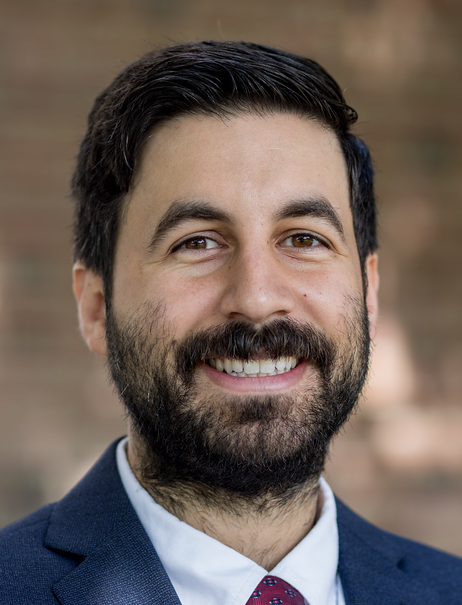
Christopher Helali is an independent investigative journalist, researcher, and geopolitical analyst. His work has appeared in the Tehran Times, South China Morning Post, TASS, VT Digger, Valley News, and CGTN and he is a frequent guest on RT and PressTV. In 2020, Chris discovered and brought to light the second phone “black” book belonging to Jeffrey Epstein which was investigated and reported by Business Insider in 2021. Chris can be reached at christopherhelali@gmail.com and you can follow him on Twitter @ChrisHelali.



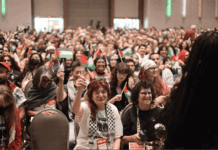


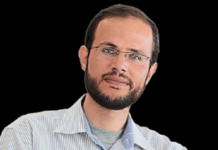
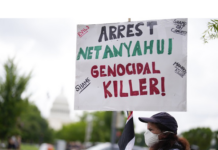
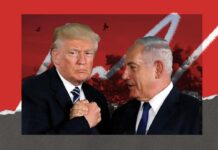
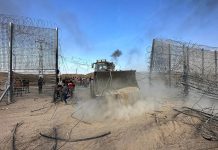

Here is an interesting perspective on the present conflict:
https://nationalpost.com/opinion/andrew-perez-my-fellow-progressives-youve-been-lied-to-about-israel
We all hope that all the suffering will end that peace will come to the Middle East, but this honorable gentleman praised the massacre that took place on October 7
https://www.jpost.com/international/article-789716